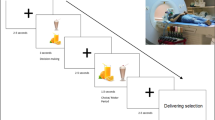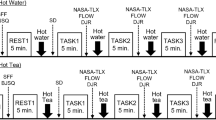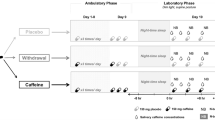Abstract
Background/objectives:
Green tea is being recognized as a beverage with potential benefits for human health and cognitive functions. In vivo studies provide preliminary evidence that green tea intake may have a positive role in improving effects on cognitive functions. We aimed to examine the neural effects of green tea extract on brain activation in humans.
Subjects/methods:
Functional magnetic resonance imaging was recorded while 12 healthy volunteers performed a working memory task following administration of 250 or 500 ml of a milk whey based green tea containing soft drink or milk whey based soft drink without green tea as control in a double-blind, controlled repeated measures within-subject design with counterbalanced order of substance administration. A whole-brain analysis with a cluster-level threshold of P<0.001 (unadjusted) was followed by an a priori-defined region of interest (ROI) analysis of the dorsolateral prefrontal cortex (DLPFC) including a cluster-level threshold of P<0.05 and family-wise error (FWE) adjustment for multiple comparisons.
Results:
Whole-brain analyses revealed no significant effects after correction for multiple comparisons (FWE P<0.05). Using a ROI approach, green tea extract increased activation in the DLPFC relative to a control condition (FWE P<0.001). This neural effect was related to green tea dosage. Green tea extract was not associated with any significant attenuation in regional activation relative to control condition.
Conclusions:
These data suggest that green tea extract may modulate brain activity in the DLPFC, a key area that mediates working memory processing in the human brain. Moreover, this is the first neuroimaging study implicating that functional neuroimaging methods provide a means of examining how green tea extract acts on the brain.
This is a preview of subscription content, access via your institution
Access options
Subscribe to this journal
Receive 12 print issues and online access
$259.00 per year
only $21.58 per issue
Buy this article
- Purchase on Springer Link
- Instant access to full article PDF
Prices may be subject to local taxes which are calculated during checkout


Similar content being viewed by others
References
Cabrera C, Artacho R, Gimenez R . Beneficial effects of green tea—a review. J Am Coll Nutr 2006; 25: 79–99.
Mandel S, Maor G, Youdim MB . Iron and alpha-synuclein in the substantia nigra of MPTP-treated mice: effect of neuroprotective drugs R-apomorphine and green tea polyphenol (−)-epigallocatechin-3-gallate. J Mol Neurosci 2004; 24: 401–416.
Mandel S, Weinreb O, Amit T, Youdim MB . Cell signaling pathways in the neuroprotective actions of the green tea polyphenol (−)-epigallocatechin-3-gallate: implications for neurodegenerative diseases. J Neurochem 2004; 88: 1555–1569.
Kuriyama S, Hozawa A, Ohmori K, Shimazu T, Matsui T, Ebihara S et al. Green tea consumption and cognitive function: a cross-sectional study from the Tsurugaya Project 1. Am J Clin Nutr 2006; 83: 355–361.
Ng TP, Feng L, Niti M, Kua EH, Yap KB . Tea consumption and cognitive impairment and decline in older Chinese adults. Am J Clin Nutr 2008; 88: 224–231.
Bhattacharyya S, Fusar-Poli P, Borgwardt S, Martin-Santos R, Nosarti C, O’Carroll C et al. Modulation of mediotemporal and ventrostriatal function in humans by Delta9-tetrahydrocannabinol: a neural basis for the effects of Cannabis sativa on learning and psychosis. Arch Gen Psychiatry 2009; 66: 442–451.
Borgwardt SJ, Allen P, Bhattacharyya S, Fusar-Poli P, Crippa JA, Seal ML et al. Neural basis of Delta-9-tetrahydrocannabinol and cannabidiol: effects during response inhibition. Biol Psychiatry 2008; 64: 966–973.
Fusar-Poli P, Crippa JA, Bhattacharyya S, Borgwardt SJ, Allen P, Martin-Santos R et al. Distinct effects of {delta}9-tetrahydrocannabinol and cannabidiol on neural activation during emotional processing. Arch Gen Psychiatry 2009; 66: 95–105.
Bhattacharyya S, Crippa JA, Allen P, Martin-Santos R, Borgwardt S, Fusar-Poli P et al. Induction of psychosis by Δ9-tetrahydrocannabinol reflects modulation of prefrontal and striatal function during attentional salience processing. Arch Gen Psychiatry 2012; 69: 27–36.
Winton-Brown T, Allen P, Bhattacharrya S, Borgwardt SJ, Fusar-Poli P, Crippa JA et al. Modulation of auditory and visual processing by Δ-9-Tetrahydrocannabinol and Cannabidiol: an fMRI study. Neuropsychopharmacology 2011; 36: 1340–1348.
Martín-Santos R, Crippa JA, Batalla A, Bhattacharyya S, Atakan Z, Fusar-Poli P et al. Acute effects of a single, oral dose of THC and cannabidiol administration in healthy volunteers. Curr Pharm Des 2012 e-pub ahead of print 7 June 2012.
Ettinger U, Williams SC, Fannon D, Premkumar P, Kuipers E, Moller HJ et al. Functional magnetic resonance imaging of a parametric working memory task in schizophrenia: relationship with performance and effects of antipsychotic treatment. Psychopharmacology 2011; 216: 17–27.
Owen WJ, Borowsky R, Sarty GEFMRI . of two measures of phonological processing in visual word recognition: ecological validity matters. Brain Lang 2004; 90: 40–46.
Smieskova R, Allen P, Simon A, Aston J, Bendfeldt K, Drewe J et al. Different duration of at-risk mental state associated with neurofunctional abnormalities – a multimodal imaging study. Hum Brain Mapp 2011 e-pub ahead of print 16 September 2011; doi:10.1002/hbm.21360.
Hayasaka S, Nichols TE . Combining voxel intensity and cluster extent with permutation test framework. Neuroimage 2004; 23: 54–63.
Petersson KM, Nichols TE, Poline JB, Holmes AP . Statistical limitations in functional neuroimaging. I. Non-inferential methods and statistical models. Philos Trans R Soc Lond B Biol Sci 1999; 354: 1239–1260.
Mai J, Paxinos G, Voss T Atlas of the Human Brain. Academic Press: San Diego, 2008.
Dupont WD, Plummer WD . Power and sample size calculations. A review and computer program. Control Clin Trials 1990; 11: 116–128.
Haque AM, Hashimoto M, Katakura M, Tanabe Y, Hara Y, Shido O . Long-term administration of green tea catechins improves spatial cognition learning ability in rats. J Nutr 2006; 136: 1043–1047.
Kaur T, Pathak CM, Pandhi P, Khanduja KL . Effects of green tea extract on learning, memory, behavior and acetylcholinesterase activity in young and old male rats. Brain Cogn 2008; 67: 25–30.
Goswami M, Mund S, Ray A . Effects of some psychotropic agents on cognitive functions in rats. Indian J Physiol Pharmacol 1996; 40: 75–78.
Unno K, Takabayashi F, Kishido T, Oku N . Suppressive effect of green tea catechins on morphologic and functional regression of the brain in aged mice with accelerated senescence (SAMP10). Exp Gerontol 2004; 39: 1027–1034.
Unno K, Takabayashi F, Yoshida H, Choba D, Fukutomi R, Kikunaga N et al. Daily consumption of green tea catechin delays memory regression in aged mice. Biogerontology 2007; 8: 89–95.
Haque AM, Hashimoto M, Katakura M, Hara Y, Shido O . Green tea catechins prevent cognitive deficits caused by Abeta1-40 in rats. J Nutr Biochem 2008; 19: 619–626.
Rezai-Zadeh K, Arendash GW, Hou H, Fernandez F, Jensen M, Runfeldt M et al. Green tea epigallocatechin-3-gallate (EGCG) reduces beta-amyloid mediated cognitive impairment and modulates tau pathology in Alzheimer transgenic mice. Brain Res 2008; 1214: 177–187.
Rezai-Zadeh K, Shytle D, Sun N, Mori T, Hou H, Jeanniton D et al. Green tea epigallocatechin-3-gallate (EGCG) modulates amyloid precursor protein cleavage and reduces cerebral amyloidosis in Alzheimer transgenic mice. J Neurosci 2005; 25: 8807–8814.
Kim DK, Lee K . Inhibitory effect of trans-N-p-coumaroyl tryamine from the twigs of Celtis chinensis on the acetylcholinesterase. Arch Pharm Res 2003; 26: 735–738.
Melzig MF, Janka M . Enhancement of neutral endopeptidase activity in SK-N-SH cells by green tea extract. Phytomedicine 2003; 10: 494–498.
Ayoub S, Melzig MF . Induction of neutral endopeptidase (NEP) activity of SK-N-SH cells by natural compounds from green tea. J Pharm Pharmacol 2006; 58: 495–501.
Chou CW, Huang WJ, Tien LT, Wang SJ . (−)-Epigallocatechin gallate, the most active polyphenolic catechin in green tea, presynaptically facilitates Ca2+-dependent glutamate release via activation of protein kinase C in rat cerebral cortex. Synapse 2007; 61: 889–902.
Wilkinson D, Halligan P . The relevance of behavioural measures for functional-imaging studies of cognition. Nat Rev Neurosci 2004; 5: 67–73.
Acknowledgements
This initiator-driven (CB) study was sponsored by the University of Basel and supported by grants from the Rivella Ltd, Rothrist, Switzerland. We would like to thank Doris Blaser for her help to prepare the manuscript.
Author Contributions
JD and CB designed the research, FH and SJB collected the data, KS provided essential materials. SJB analyzed data and performed statistical analysis. All authors wrote the paper. SJB and CB had primary responsibility for the final content.
Disclosure
The sponsor of the study had no role in the study design, the collection, analysis and interpretation of data, the writing of this report, or in the decision to submit the paper for publication.
Author information
Authors and Affiliations
Corresponding author
Ethics declarations
Competing interests
The authors declare no conflict of interest.
Rights and permissions
About this article
Cite this article
Borgwardt, S., Hammann, F., Scheffler, K. et al. Neural effects of green tea extract on dorsolateral prefrontal cortex. Eur J Clin Nutr 66, 1187–1192 (2012). https://doi.org/10.1038/ejcn.2012.105
Received:
Revised:
Accepted:
Published:
Issue Date:
DOI: https://doi.org/10.1038/ejcn.2012.105
Keywords
This article is cited by
-
Mental Performance and Sport: Caffeine and Co-consumed Bioactive Ingredients
Sports Medicine (2022)
-
The Effects of Green Tea Extract on Working Memory in Healthy Women
The Journal of nutrition, health and aging (2018)
-
Protective Effects of Foods Containing Flavonoids on Age-Related Cognitive Decline
Current Nutrition Reports (2018)
-
The effect of black tea on human cognitive performance in a cognitive test battery
Clinical Phytoscience (2017)
-
Green tea polyphenols and their potential role in health and disease
Inflammopharmacology (2015)



